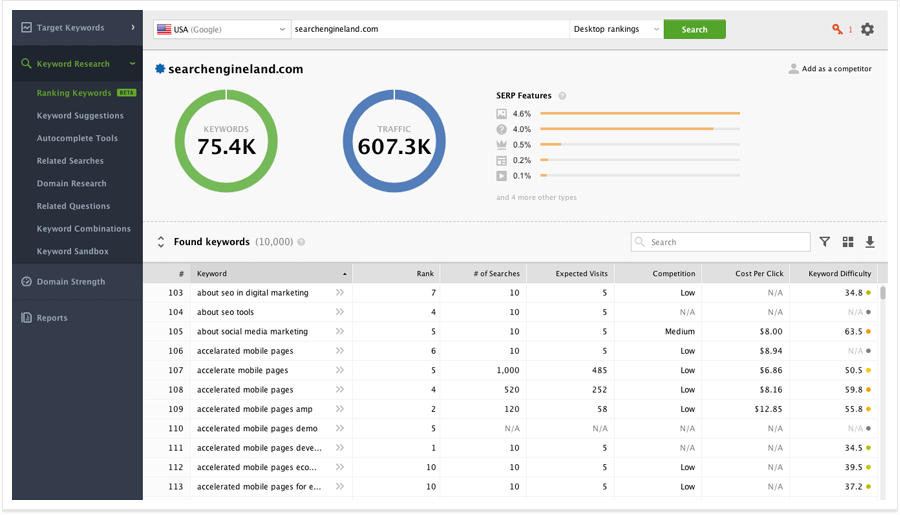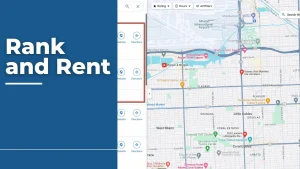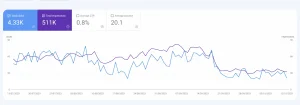Key Takeaways
- Keyword research is crucial because it helps you find the right keywords to target
- If your website doesn’t rank well in search engine results pages (SERPs)
- Optimizing your website content for search engine optimization (SEO) is one of the most important steps in increasing conversion rates
Finding the right keyword is critical to search engine optimization (SEO).
Your website and business may struggle to reach potential customers without identifying the right keywords to target.
This blog post will discuss the various keywords, explain why keyword research is essential, and provide tips for choosing the right keywords for your business.
By following these guidelines, you can ensure that your website is discovered by the right people and maximize the effectiveness of your SEO efforts.
What is keyword research?
Website optimization is crucial for ranking on search engine results pages.
One of the critical components of optimization is conducting thorough keyword research to identify the most relevant and effective keywords for your website and its content.
There are various methods for conducting keyword research, but one of the most reliable and user-friendly approaches is keyword analysis.
Keyword analysis involves gathering and analyzing data from multiple sources, such as Google Trends and search engine results pages (SERPs), or using a dedicated tool like Long Tail Pro.
This process enables you to identify high-value keywords that can help drive traffic to your website and improve your overall visibility in search results.
Once you have identified your target keywords, the next step is to create high-quality content optimized for these keywords.
This requires careful attention to factors such as keyword density, keyword placement, and overall relevance to the topic at hand.
By creating excellent content optimized for your target keywords, you can improve your website’s search engine rankings and attract more traffic and engagement from your target audience.
The Different Types Of Keywords

Keywords are one of the fundamental components of search engine optimization (SEO). They are the words or phrases that users type into a search engine when looking for information or solutions to their problems.
In SEO, keywords are crucial because they help search engines determine what your content is about and match it with relevant user queries.
There are different types of keywords that you can use to optimize your website for search engines.
Here are some of the most common types:
- Short-tail keywords: Also known as head or broad keywords, these are generic keywords consisting of one or two words. They have a high search volume but are highly competitive, making them difficult to rank for. Examples include “shoes,” “pizza,” or “travel.”
- Long-tail keywords: They are more specific keyword phrases consisting of three or more words. They have a lower search volume but are less competitive, making them easier to rank for. Examples include “best running shoes for women,” “gluten-free pizza recipe,” or “cheap travel destinations in Europe.”
- Branded keywords: These are keywords that include your brand name or variations of it. They help users find your website or products specifically. Examples include “Nike shoes,” “Coca-Cola,” and “Amazon Prime.”
- Product keywords: Specific keywords related to your products or services. They help users find your offerings and can lead to more conversions. Examples include “running shoes,” “pizza delivery,” or “travel insurance.”
- Competitor keywords: These are keywords your competitors use to rank for. Analyzing your competitor’s keywords can help you identify opportunities to improve your strategy. Examples include “Adidas shoes,” “Pepsi,” and “eBay.”
- Geo-targeted keywords: They are location-specific keywords that help users find businesses or services nearby. Examples include “best pizza place in New York,” “travel agency in London,” or “shoe store near me.”
Understanding the different types of keywords and how to use them can help you optimize your website for search engines and attract more traffic.
Creating a keyword strategy relevant to your business and aligning with your overall SEO goals is essential.
Why finding the right keyword necessary?
Using the right keywords is necessary for a variety of reasons.
First and foremost, using the right keywords makes it easier for your target audience to find your content.
You can attract people interested in your offer by including relevant keywords in your website, social media, or marketing materials.
In addition, using the right keywords can improve your search engine rankings, making it more likely that your content will be found by people searching for information related to your business or industry.
This can lead to increased visibility, traffic, and sales.
Furthermore, using the right keywords can help you stand out from your competitors by highlighting your unique value proposition and differentiating your brand in the marketplace.
Using the right keywords is crucial to effective digital marketing and can help you achieve your business goals.
Marketing Trend Insight

Marketing trends constantly evolve, and businesses must stay up-to-date with the latest insights to remain competitive.
One of the most significant trends in recent years is the shift towards digital marketing.
With the increasing popularity of social media platforms, online advertising, and mobile devices, businesses have recognized the importance of digital marketing to reach their target audience effectively.
Additionally, personalization has become a key focus, as consumers increasingly expect tailored experiences based on their preferences and behaviours.
Traffic Growth
Traffic growth is crucial for any business seeking to expand its online presence and increase brand awareness.
There are various strategies companies can use to grow traffic, such as improving website design and functionality, creating high-quality content, and utilizing social media and email marketing campaigns.
Optimizing website content for search engines through SEO techniques can increase website visibility and attract more traffic.
Paid advertising can also help drive traffic growth, with options like pay-per-click (PPC) advertising and social media advertising available.
Another effective strategy for traffic growth is building backlinks, which can improve website authority and increase the likelihood of appearing in search engine results pages.
Overall, achieving traffic growth requires a multi-faceted approach that combines various strategies to attract more visitors to a business’s website, ultimately leading to increased brand awareness, higher conversion rates, and business growth.
Customer Acquisition
Customer acquisition is an essential part of any content marketing strategy.
By understanding your customers and targeting keywords that are relevant to them, you can ensure better search engine rankings and more leads coming in from potential customers.
Paid search campaigns are a great way to attract new customers, but stay on top of Google’s algorithm changes!
This could mean a loss of traffic for your business if you’re not careful.
Elements Of Keyword Research

Keyword research is crucial in any successful search engine optimization (SEO) strategy.
It involves identifying the words and phrases people use to search for information related to your business or industry.
By incorporating these keywords into your website content, you can improve your website’s visibility and attract more traffic from search engines.
Here are some essential elements of keyword research:
- Understanding Your Target Audience: You must understand your target audience to choose the right keywords. Who are they? What are their interests, preferences, and pain points? What language do they use to describe your products or services? By answering these questions, you can identify the most relevant and valuable keywords for your audience.
- Keyword Research Tools: Many keyword research tools can help you find relevant keywords for your business. Some popular tools include Google Keyword Planner, Ahrefs, SEMrush, and Moz Keyword Explorer. These tools provide data on search volume, keyword difficulty, and related keywords that can help you optimize your content.
- Competitive Analysis: Analyzing your competitors’ websites can provide insights into the keywords they are targeting and their SEO strategy. You can use this information to identify gaps in the market and find new opportunities for your business.
- Long-tail Keywords: Long-tail keywords are longer phrases that are more specific and targeted than broad keywords. They may have lower search volume but higher intent and conversion rates. Incorporating long-tail keywords into your content can help you attract more qualified leads and improve your search engine rankings.
- Keyword Mapping: Once you have identified your target keywords, you need to map them to the relevant pages on your website. Keyword mapping involves optimizing your website content, meta tags, and URLs for each keyword. Keyword mapping ensures that search engines understand the relevance of your content to specific queries and improves your website’s overall SEO.
By understanding your target audience, using keyword research tools, analyzing your competitors, and optimizing your content for relevant keywords, you can improve your website’s visibility, attract more traffic, and generate more leads and conversions for your business.
1. Relevance
Relevance is critical when it comes to keyword research. Make sure you select keywords relevant to your website and target market, as well as the topic of your content.
Having a keyword research strategy before starting work on your site is essential so you know where potential keywords lie.
To avoid keyword stuffing, consider what people commonly search for on the internet and include those terms in your content.
Think about whether or not any of these keywords could be used together – then go ahead and add them!
And finally, make sure that all of your content (blog posts, articles, etc.) includes at least some mention of the chosen keywords – this will help ensure high-quality organic search results for them.
2. Volume
One of the most critical factors in effective online marketing is volume.
How many times your keyword or keywords are searched for on search engine results pages (SERPs) will determine how successful your advertising campaign will be.
That being said, you also have to consider other variables such as the quality of traffic – do they appear interested in what you’re selling? – and target keywords that are relevant to your business and target audience.
The better these three things are aligned, the more likely you’ll see a return on investment from content marketing efforts related to those keywords.
3. Authority
Authority is one of the most critical factors in affiliate marketing. Without it, your efforts will be fruitless.
It would be best if you used a tool like Google AdWords Keyword Planner to achieve authority.
This tool helps you find relevant and valuable keywords for your audience.
You also need to ensure the keywords you choose are not too competitive or hard to rank for – this could result in lower traffic and ROI (ROI stands for Return on Investment).
It’s always a good idea to research keywords that are being used by high-traffic websites in your niche – this way; you’ll be able to target potential customers with ease.
How To Find The Best Keywords For Your Website?
Finding the best keywords for your website is an essential aspect of search engine optimization (SEO) and can significantly impact the success of your online presence.

Here are some tips for identifying the most effective keywords for your website:
- Brainstorm: Start by brainstorming a list of words and phrases you think people would use to search for your website or its content. Consider your website’s main topics and themes and your products or services.
- Use keyword research tools: Utilize keyword research tools such as Google Keyword Planner, SEMrush, or Ahrefs to identify additional keywords and get insights on their search volume, competition, and relevance to your website.
- Analyze your competition: Look at the keywords your competitors are targeting and ranking for, and consider if there are any opportunities to target similar or related keywords that they may have missed.
- Consider long-tail keywords: Long-tail keywords are longer and more specific keyword phrases that can be easier to rank for and may have a higher conversion rate. Consider niche or particular keywords your audience may use to find your website.
- Focus on intent: Consider the meaning behind the keywords your audience is searching for. Are they looking for information, a product, or a service? Targeting keywords that match the intent of your audience can help drive more relevant traffic to your website.
- Analyze and refine: Continuously analyze your keyword strategy based on performance metrics such as search engine rankings, website traffic, and conversions. Adjust your keyword targeting and content strategy as needed to ensure you are targeting the most effective keywords for your website.
Following these tips and regularly updating your keyword strategy can improve your website’s visibility and attract more relevant traffic from search engines.
What Are The Benefits Of Using Keywords In Your Website Content?
Using keywords in your website content can benefit your search engine optimization (SEO) efforts and overall online presence. Here are some of the main benefits:
- Improved search engine visibility: Including relevant and strategic keywords in your website content can enhance your website’s visibility in search engine results pages (SERPs), making it easier for potential customers or visitors to find your website.
- Increased traffic: By targeting keywords with high search volume and relevance to your website, you can attract more traffic, potentially leading to increased sales, leads, or engagement.
- Better user experience: By incorporating keywords naturally and strategically into your website content, you can provide a better user experience for your visitors, making it easier for them to find the information they are looking for and engage with your website.
- Higher search engine rankings: When search engines see that your website content is relevant and valuable to users based on the keywords used, they are more likely to rank your website higher in SERPs, leading to increased visibility and traffic.
- Improved content organization: Incorporating keywords into your website can also help you organize and structure your content in a way that is easy to navigate and understand for both search engines and users.
Overall, incorporating keywords into your website content can be a valuable tool for improving your website’s visibility, attracting more relevant traffic, and providing a better user experience for your audience.
However, it is essential to use keywords naturally and strategically without sacrificing the quality and value of your content.
Higher Rankings On Google And Other Search Engines
SEO is crucial for any business’s success in today’s digital age.
It involves optimizing your website to rank higher on search engine results pages (SERPs), which can lead to increased website traffic and potential customers.
You must use relevant keywords specific to your website’s topic to achieve high rankings rather than too general.
This approach ensures that your content is easily discoverable by both search engine bots and human users, resulting in higher click-through rates (CTRs) and more conversions.
Moreover, placing keywords within your page content can also enhance SERP visibility, so it’s essential to use them strategically and organically within your content.
These SEO tactics can boost your website’s online presence and attract more visitors.
Increased Traffic
If your website doesn’t rank well in search engine results pages (SERPs), it’s not because you lack the necessary keywords.
Keyword-rich content is often penalized due to spammy language or irrelevant topics.
So, ensure that everything on your website is keyword-friendly and research which keywords are most relevant to your niche market.
Experiment with different keyword placements within your site’s content to increase traffic further.
You may be surprised at how much traffic a little optimization can bring in!
Finally, don’t forget about regular blog updates – these will keep people coming back for more information long after they’ve left your homepage.
Website traffic is always an important topic. Optimizing your website for search engines and keyword research can increase your site’s visibility and boost traffic figures.
You don’t need to spend a fortune on ads or create hundreds of pages of useless content – with the right strategy and a few simple tools.
You can achieve great results without going overboard. And best of all? The process is practically ongoing – so there’s no reason not to start seeing some positive results today!
More Satisfied Customers
Keyword research is essential for any business that wants to target a specific audience and achieve higher search engine rankings.
By understanding current trends, you can choose keywords which are related to your niche but also keyword-rich enough so that searchers will find what they’re looking for.
In addition, having high-quality website content with relevant keywords helps people find your site more easily – resulting in more satisfied customers who are more likely to buy from you.
By successfully implementing keyword research into your SEO strategy, businesses can confidently target potential customers and increase their chances of success.
More organic clicks
Keyword research is an essential part of effective content marketing.
By targetting relevant keywords and phrases, you can increase your chances of attracting organic traffic to your website.
This type of traffic is more likely to click through to your page and make a purchase, which leads to increased revenue for both you and the search engine optimization (SEO) company you choose.
 Image: Moz
Image: Moz
Be sure not to neglect the importance of keyword density when optimizing content for search engine results pages (SERP).
Too few keywords will impact rankings, while too many will clutter the page with irrelevant results.
A good rule-of-thumb would be 1% keyword placement per 500 words or less.
Better conversion rates
Optimizing your website content for search engine optimization (SEO) is one of the most important steps in increasing conversion rates.
By keyword researching, finding keywords that are relevant to your niche, and optimizing them correctly, you can increase traffic and boost conversions.
To help make sure that all content on your site gets indexed by search engines- regardless of where it appears- use the Google Adwords Keyword Planner tool to identify potential keywords related to what you’re selling.
Once you’ve found some good keywords, ensure they appear prominently throughout your content so searchers can find them easily.
And finally – don’t forget about making the content accessible for people to read!
Use SEO guidelines and keyword placement techniques to elevate it from the page rankings list and give visitors a great experience searching for what they need on your website.
How To Choose A Keyword That Is Relevant To Your Business
Choosing the right keywords for your business is essential for effective SEO.
To begin, identify the core topics relevant to your company and brainstorm keywords your target audience may be searching for.
Conduct keyword research to analyze search volume and competition for each keyword and prioritize those with high search volume and low competition.
Additionally, consider long-tail keywords that are more specific to your business and can help attract highly targeted traffic.
Once you have selected your keywords, incorporate them naturally into your website content, meta descriptions, and title tags.
Choosing relevant keywords and optimizing your content accordingly can improve your chances of ranking higher in search engine results pages and driving more organic traffic to your website.
Negative Keywords And Their Importance In SEO
Negative keywords are a crucial aspect of effective SEO as they allow you to filter out unwanted or irrelevant traffic to your website.
Negative keywords are the opposite of common keywords, as they are terms or phrases for which you do not want your ads to appear.
For example, if you run a vegetarian restaurant, you may want to use “meat” as a negative keyword to prevent your ads from being shown to users searching for meat-based dishes.
By using negative keywords, you can reduce your advertising costs and improve your conversion rates by targeting only those users who are genuinely interested in your products or services.
It is essential to regularly review and update your negative keyword lists to ensure that your ads are being shown to the right audience and that your budget is being used effectively.
Overall, negative keywords are a powerful tool that can help you optimize your ad campaigns and increase your ROI.
Why is it important to select the right negative keywords?
Selecting the right keywords is essential for optimizing your website’s search engine results page (SERP).
By excluding certain types of traffic, you can increase the chances of converting more visitors into customers.
Negative keywords are also important because they help to filter out irrelevant traffic from your website.
Thus, targeting the correct keyword(s) can improve your site’s organic search ranking and click-through rate (CTR).
Conclusion
By now, you must be familiar with the term ‘ keyword research ‘. Keyword research is the process of identifying the right keywords to target your website with.
Without keyword research, your website will not be able to rank well on search engine results pages (SERPs).
In this blog post, we have outlined the different types of keywords, explained the importance of keyword research, and provided tips on choosing the right keywords for your website.
Read through all the content and apply what you’ve learned to help improve your website’s search engine rankings!


